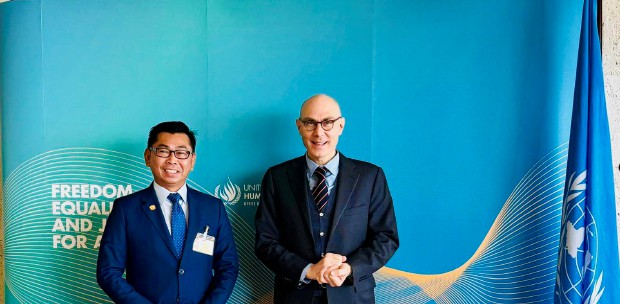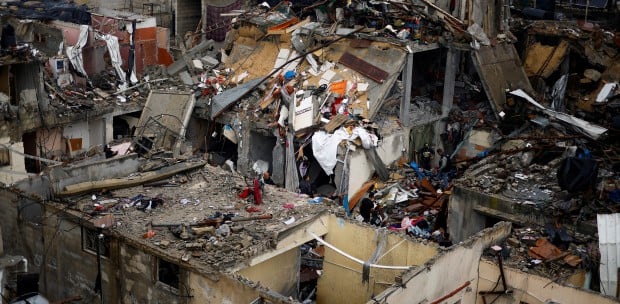In the first instalment of the Pirates of the Caribbean film, there is a scene where Will Turner, portrayed by Orlando Bloom, takes umbrage when Captain Jack Sparrow, ably portrayed by Johnny Depp, tells the former that his late father was a pirate.
Upon expressing his indignation and insisting that his late father was a good respectable man who obeyed the law, Turner is almost cast overboard and warned by Sparrow that there are only two sorts of rules that really matter, namely what one can do and what can't do.
I have come to appreciate this scene, having so often encountered the very same situation in my dealings with the United Nations (UN).
Most activists involved in human rights work are aware that just like in the movie, there are some matters in which the UN can do something about, and others in which the UN is powerless.
The Palestinian issue, which has been around for more than 70 years now, counts as an area in which the UN is simply incompetent to do nought but howl in protest time and again.
The reason is obvious. It is all due to Israel and her lackey, the United States, doing the former's bidding in the UN Security Council, exonerating and absolving Israel from all and sundry genocides and war crimes it has committed against the Palestinians for decades.
The latest impotent attempt of this international organisation to contain genocidal rampages of the Zionist regime is to "urgently establish an ongoing independent, international commission of inquiry, to be appointed by the president of the Human Rights Council, to investigate in the Occupied Palestinian Territories, including East Jerusalem, and in Israel all alleged violations of international humanitarian law and all alleged violations and abuses of international human rights law leading up to and since April 13, 2021, and all underlying root causes of recurrent tensions, instability and protraction of conflict, including systematic discrimination and repression based on national, ethnic, racial or religious identity".
Needless to say, most of us expect very little to be accomplished by this futile endeavour aside from adding a few more citations to Wikipedia regarding the conflict.
The commission itself has recognised its own futility in putting a stop to human rights violations committed by Israel. One of the stated commitments of the inquiry is to "report on its main activities on an annual basis to the Human Rights Council", which is another way of saying they do not expect results in the foreseeable future.
Israel, of course, will not cooperate. They will reject any finding that incriminates Israel in any way, and the US, being the obedient lackey, will reliably ensure that even non-binding recommendations are dismissed without so much as a gesture of consideration.
The UN, quite simply, is powerless against Israel, and Israel, the US and the UN itself all know it. If there is any hope for the Palestinian plight at all, it is in the increasing irresistibility of popular opinion.
The Internet, particularly social media, is a potential game changer. When Jonathan Freedland wrote in the Guardian on May 21 that "Israel should take note: the weight of opinion is turning against it", it wasn't exactly inaccurate.
For decades, the American mainstream media has played down the countless Palestinian lives lost at the hands of Israel, but I am encouraged by news reports from the US indicating that, for the first time ever, there are members of the US Congress, namely Bernie Sanders and Alexandra Ocasio Cortez, who openly condemned Israel and are attempting to derail arm sales agreed between the two countries.
While Americans have been late to the party, global opinion has always been against the occupation, illegal settlements, the Gaza blockade, Israel's wanton brutality against the Palestinians and the apartheid system imposed in the Palestinian Territories.
Global opinion, however, never had a voice in the mainstream media until now.
There is much increased support for the legitimate rights of the Palestinians and condemnation of Israel's crimes against them, as evidenced by the flooding of critical comments against Israel on every major social media platform following Israel's storming of the Al-Aqsa Mosque, and throughout the 11 days of indiscriminate airstrikes against Gazan civilians.
In the aftermath of the Sheikh Jarrah protests and Gaza bombardment, the unthinkable has happened — the Palestinian plight is being discussed openly online, questioned, criticised and condemned.
This would never have been aired on network television, or published in mainstream journals in the West only a decade or two ago. Conceptualisations, such as the inherently racist foundations of Israel as a "Jewish State" and the moral and intellectual bankruptcy of Zionism itself can only be music to the ears of all human rights activists involved.
One is hopeful and considers it plausible that the overwhelmingly negative sentiments across social media were a key impetus prompting Israel to agree to the Gaza ceasefire.
Indeed, the nature of the game has changed.
The international community, once a buzz term used by the Western media in propagating the wants and whims of the West to be foisted upon the hapless others of this world, has finally come unto its own.
Various nations of the world have had, and can continue to have, a greater impact than the UN has ever had on achieving justice for not only the Palestinians, but also the Rohingya and other oppressed minorities. Long may this continue.
The writer is founder, Centre for
Human Rights Research and Advocacy (CENTHRA)





